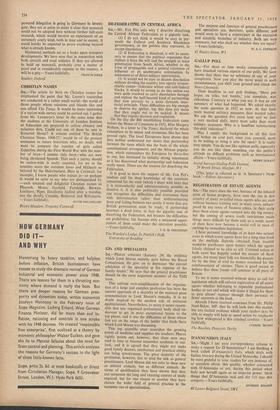GPs AND SPECIALISTS SIR,—Pharos criticises (January 24) the evidence which
Lord Moran recently gave before the Royal Commission. He goes on to deprecate 'the current adulation of the specialist at the expense of the family doctor.' He says that the general practitioner should be the most important member of the NHS team.
This curious over-simplification of the organisa- tion of a large and complex profession has been the current approach of a majority of the national press commentators to Lord Moran's remarks. It is no doubt inspired by the modern cult of universal egalitarianism. Nevertheless, to many it seems reason- able that any organised professional body shall en- deavour to get its more exceptional brains to the top places, and it was the difficulties of those whose feet are on the rungs of the ladder that leads there which Lord Moran was discussing.
This top scientific crust nourishes the growing points of medicine and supplies the teachers. Pharos rightly points out, however, that these men may tend in time to become somewhat academic in out- look, and it is agreed that they might not make good family doctors, intellectual and practical ability not being synonymous. The great majority of the profession, however, live to tend the sick as general practitioners. Lord Moran did not refer to these men as inferior animals, but as different animals. By virtue of qualification they have shown that they can surmount the long and exacting courses of study required, but for one reason or another they have chosen the wider field of general practice to the narrower one of specialisation.
The purpose and function of general practitioners and specialists are, therefore, quite different and would seem to have a counterpart in the executive and scientific branches of industry. Both are very necessary, but who shall say whether they are equal?






































 Previous page
Previous page